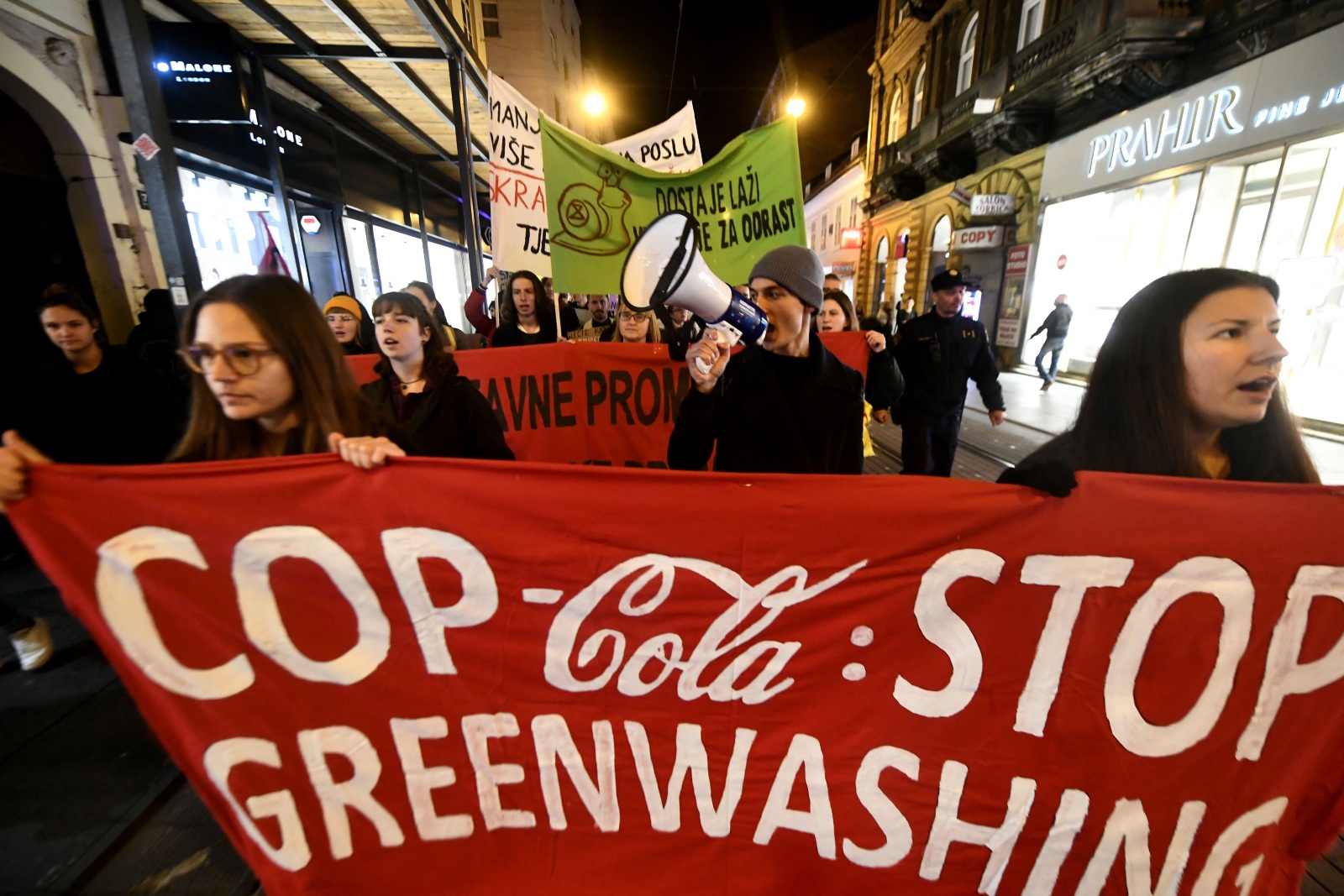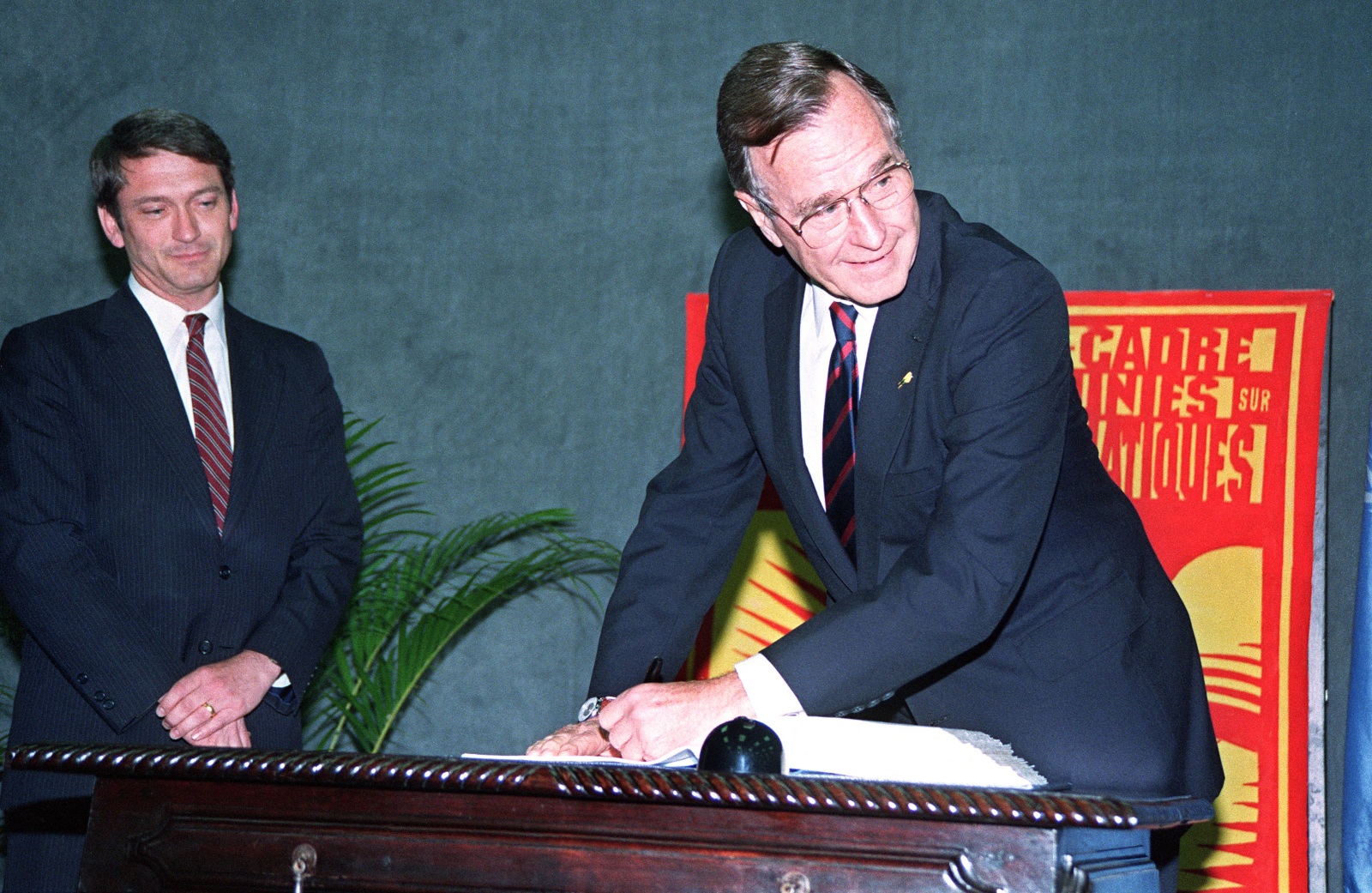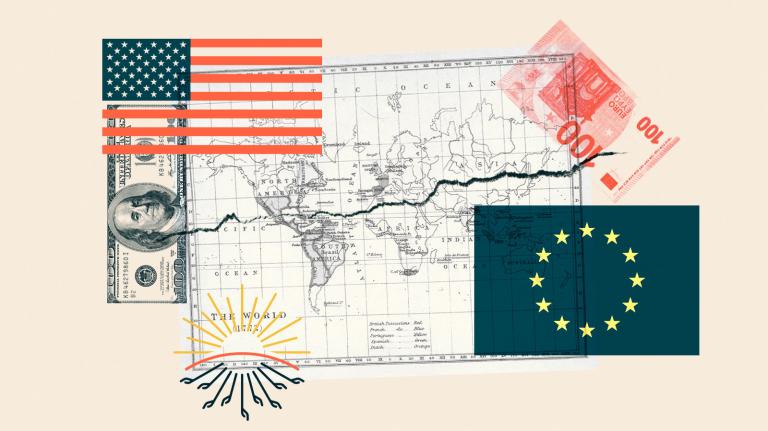Once a year, delegates from almost 200 countries gather for the purpose of finding ways to keep climate change from spiraling out of control. This time around, they’re meeting in Sharm el-Sheikh, Egypt, for COP27. And the event is brought to you by the largest plastic producer in the world, Coca-Cola.
While Coca-Cola is considered a lower-tier sponsor than the conference’s “partners,” which include Microsoft, IBM, and Bloomberg Philanthropies, Coca-Cola’s role has garnered an exceptionally large amount of criticism. Nearly 240,000 people have signed a petition for the Egyptian government-led conference to drop the partnership with Coca-Cola, a corporate giant that makes roughly 4,000 plastic bottles from oil every second.
Over the years, climate summits have become a branding opportunity for corporations to attach their names to high-profile efforts to save the world. One report found that the companies sponsoring the 2015 summit in Paris, for example, had paid around $18.8 million, about 10 percent of the total budget. It can be hard for organizers of an expensive-to-run conference to turn down that kind of money. But those sponsorships have become a target of protest as activists seek to show how companies like Coca-Cola have contributed to the climate crisis, the very thing COP27 is supposed to address.
The Coca-Cola debacle inspired a recent political cartoon that contrasts the conference’s lofty goal of limiting climate change with the merch-filled expo that takes place alongside it. “Make sure you grab your COP27 gift bag,” says a comic by Australian cartoonist Andrew Marlton. The panels advertise fictional swag: a shirt that says “My environment minister went to COP27 and all I got was this lousy t-shirt,” an “economy-size bottle of greenwash,” and the new book by Swedish activist Greta Thunberg (“no need to read it, just be seen with it”). Thunberg, for her part, decided to skip the conference in Sharm el-Sheikh, in part because of the corporate-friendly atmosphere.
All the logos on display at COP27 hint at what’s going on behind the scenes: Companies have been influencing the global climate negotiations since their inception in Rio de Janeiro 30 years ago, working to make sure that the final agreement would not force them to cut emissions from fossil fuels. Instead, they began volunteering “net-zero” pledges to cancel out their emissions at some later date. They’ve also started to shape the conversation at every summit. When COP27 attendees talk about “net-zero” and the need for ever-better climate data, for example, they are talking about climate change in a language that businesses helped develop, and one that experts say distracts from the true goal: the need to reduce fossil fuel emissions.
The Coca-Cola sponsorship “seems outrageous to me,” said Adam Rome, an environmental historian at the University at Buffalo. “But if you’re in a world where pretty much everything is voluntary and everything has to make, ultimately, business sense, then you’re going to get net-zero pledges, and you’re going to get corporate sponsorships of government or civil society.”

Even though oil companies haven’t been allowed to sponsor the talks, the fossil fuel industry still has a huge presence: By one count, it sent more than 630 lobbyists to Sharm el-Sheikh, a larger delegation than sent by any country except the United Arab Emirates, the host of next year’s climate summit. (It wasn’t until last year that the conference’s final agreement mentioned the phrase “fossil fuels” at all — and even then, the language got watered down.) COP27 has also been criticized for hiring a public relations firm, Hill+Knowlton Strategies, that has represented oil companies such as ExxonMobil, Chevron, Shell, and Saudi Aramco, to manage communications.
Climate advocates often justify corporate involvement by saying that companies have a role to play in financing the changes that are needed, said Jennie Stephens, a professor of sustainability science and policy at Northeastern University. But she believes that corporate influence at negotiations is preventing “more transformative action” from resulting. Instead of denying the problem or undermining science, those who oppose reducing emissions are now focused on delaying climate action, Stephens said. “Part of delay is to acknowledge the problem and then present corporate interests as if they’re doing something to mitigate problems, when in fact, they’re not.”
Despite talking about fixing climate change more than ever, for instance, all major oil companies are on track to increase oil production by 2026, according to a report earlier this year. “If they are still planning to extract all these fossil fuels in perpetuity,” Stephens said, “there’s no way we’re ever going to meet any of the goals that all the countries have committed to in this whole long, expensive process that so much time and effort has gone into.”
So how did corporations become such major players in climate politics? It goes back to an old public relations strategy. In the 1960s and ’70s, environmental activists brought attention to how polluters were setting rivers on fire, spilling oil into the ocean, and spraying pesticides everywhere. Companies were branded as villains and were forced to get in line with new regulations to prevent pollution.
Around that time, a young PR rep named E. Bruce Harrison figured that the key to avoiding future regulations was all about compromise. Calling for “balance” between the “Three Es” — the environment, energy, and the economy — would make the industry’s position look reasonable and responsible, and leave environmentalists looking like they wanted to ruin the economy. By working with environmentalists, companies could appear to be doing the right thing — and get a seat at the table where decisions got made.
That’s exactly what businesses did leading up to a major U.N. climate agreement in 1992. The first order of business of the Global Climate Coalition — a group of utilities, oil drillers, automakers, and other companies assembled by the National Association of Manufacturers a few years earlier — was to influence the international treaty that would be signed in Rio de Janeiro. At negotiating sessions, industry representatives argued for a voluntary approach to reducing emissions, in the hopes of avoiding a binding one. They got what they asked for. A National Association of Manufacturers business activity report in 1992 congratulated itself on a “strong and effective presence” during the Rio negotiations.

After that, the Global Climate Coalition “actively lobbied” ensuing climate conferences to make sure companies wouldn’t be forced to cut emissions, according to a report by Robert Brulle, a sociologist at Brown University. It also lobbied Congress and the White House to make sure that the United States, the biggest emitter in the world in the 1990s, would not ratify any binding climate treaties that managed to pass anyway. In 2001, when President George W. Bush withdrew from the Kyoto Protocol, which would have required countries to cut carbon emissions, White House staff met with the Global Climate Coalition to congratulate them. “POTUS rejected Kyoto, in part, based on input from you,” read the talking points prepared for Paula Dobriansky, the lead negotiator on U.S. climate policy at the time.
The coalition disbanded in 2002, with its mission accomplished, but companies never left the scene of climate negotiations. They gradually took on more of a sponsorship role and began setting up official-looking side events.
Corporations’ high level of involvement in the negotiations is a natural outcome of people’s lack of faith in government to take action on climate change, and the belief that businesses can help fill in the gap, Rome said — an idea that’s been in force since around 1990. “There’s obviously still a lot of people who are skeptical of what corporations will do,” he said. “But a lot of other people, whether grudgingly or not, have thought, ‘Well, government isn’t going to do anything. Businesses are usually powerful institutions. If anybody can do something, it’s business.’”
Companies and governments often pledge to go “net-zero” — meaning that they’ll suck up as much carbon dioxide as they emit — but such plans are often light on the details. The United Nations says it wants to crack down on these wishy-washy climate promises. Last week, it issued a new report offering guidelines to make “net-zero” pledges more meaningful. The report was perceived as taking companies to task — the U.N. secretary-general, António Guterres, said there must be “zero tolerance for net-zero greenwashing.”
But experts told Grist that the bigger issue was that the United Nations was spending so much time talking about “net-zero.” While the concept of zeroing out emissions could work, in theory, critics say it is too ambiguous to be meaningful and easily gets exploited by policymakers and companies. A recent study analyzing public pledges from hundreds of large global companies found that 93 percent of them were on track to miss their emissions goals.
For those who see “net-zero” as bogus, talking about it might end up perpetuating the problem. Rome thinks that the U.N. report’s focus on getting companies to follow through on their pledges seemed to be dodging a real solution: requiring companies to cut emissions. The report “only guarantees that we’ll spend a lot more time talking about the details, when the whole idea of it is the problem,” he said.

Squabbling over details has become a feature of U.N. climate conferences as well as discussions around corporate sustainability, said Matthew Archer, a professor of sustainability at the University of York in the United Kingdom. Archer is writing a book arguing that “endless discussions” about metrics and measurements can distract from the real work that needs to be done on climate change. He argues that, while accurate data is needed, the search for ever-more-accurate numbers has become a form of delaying action itself.
“The whole conversation [around net-zero] is turning toward, ‘Oh no, you’re measuring it wrong, you haven’t considered this aspect,” Archer said. The debates “end up just becoming technical squabbles and people fighting over very minor methods and methodological questions,” while ignoring the bigger questions about power in politics — such as whether net-zero is a helpful way to achieve climate goals at all.
Rome says that voluntary action from corporations will never be enough to solve the climate crisis. “The whole last 30 years has been this vast experiment in what they are willing to do voluntarily,” he said, with lackluster results. The world doesn’t need more “good” companies to make more net-zero pledges, Rome explained: It needs rules that force all companies to cut their emissions.
Coca-Cola may be in the spotlight for greenwashing with its sponsorship of the latest climate summit, but the problem is much bigger than one company. The U.N. has been “trying to distinguish the good guys from the bad guys in the corporate world,” Rome said. “That’s important, but it’s not nearly as important as pointing out that at the end of the day, we need something beyond more good guys.”



